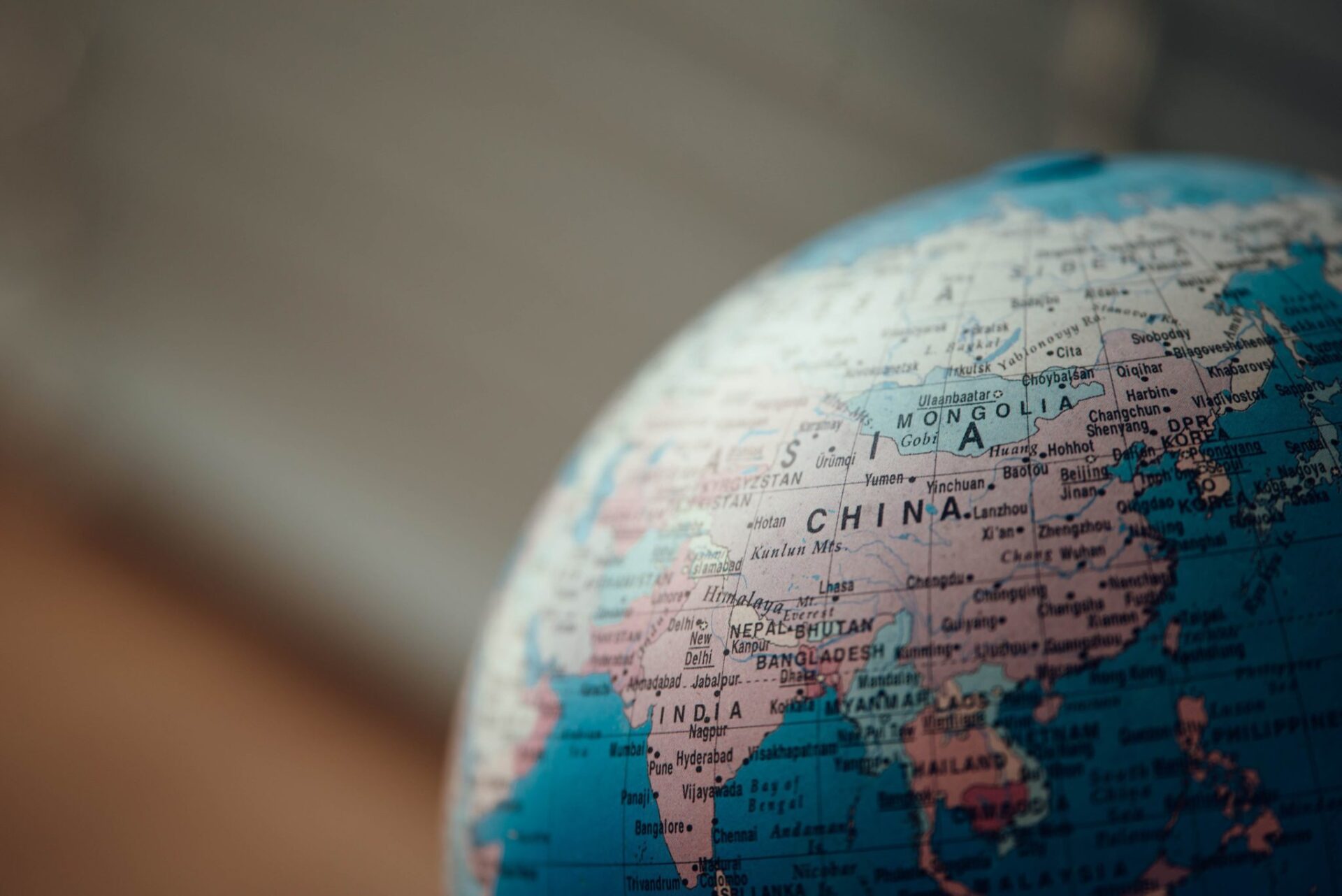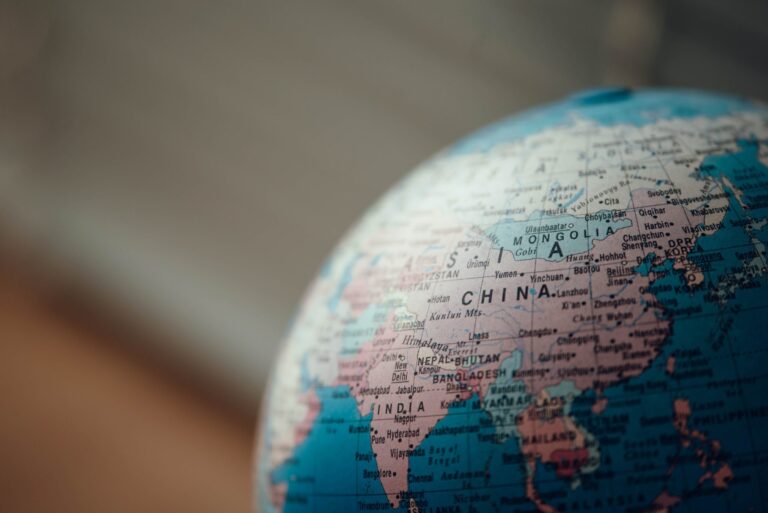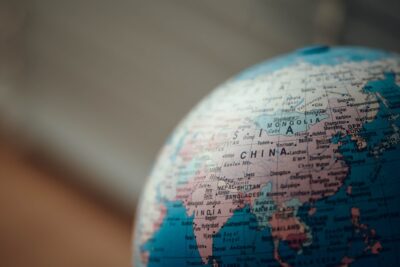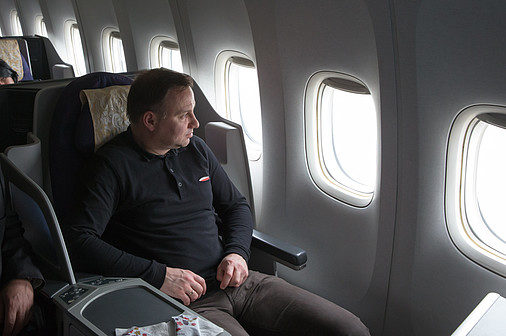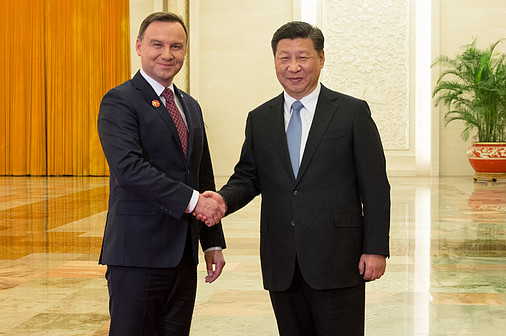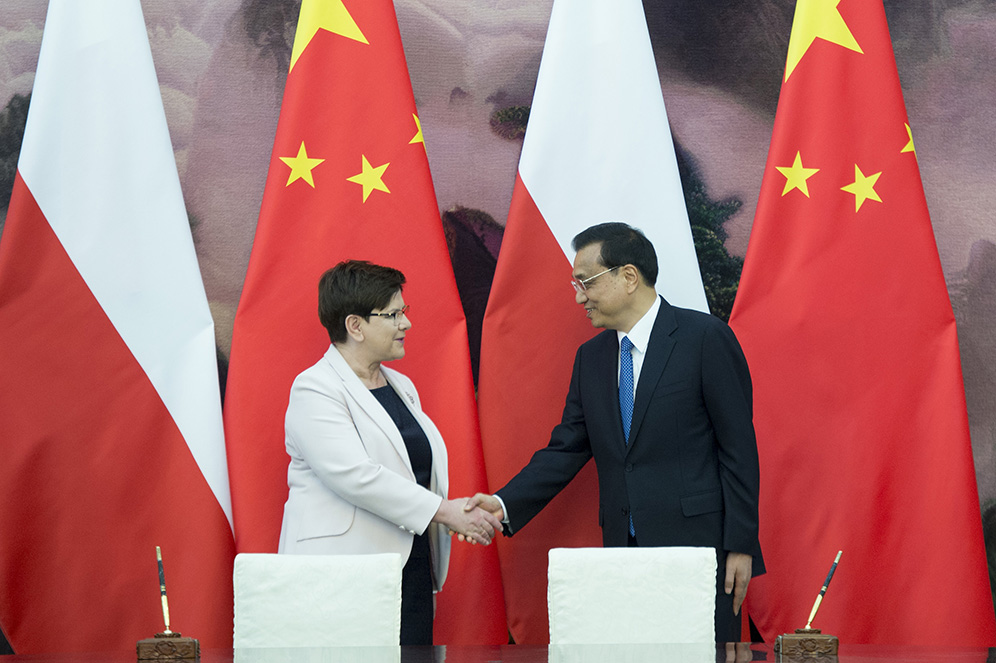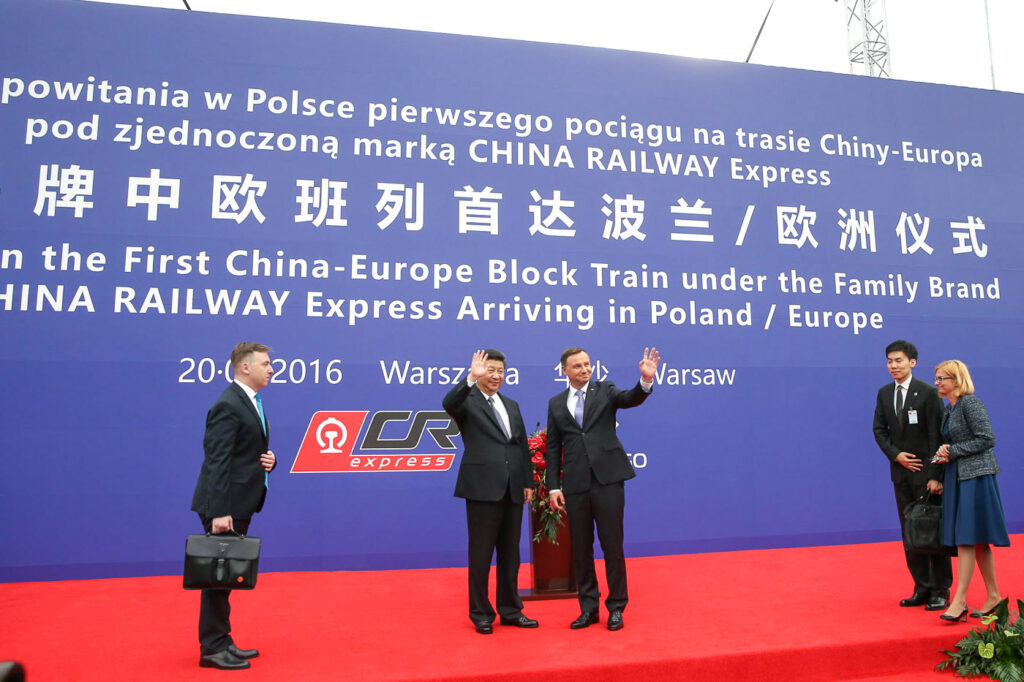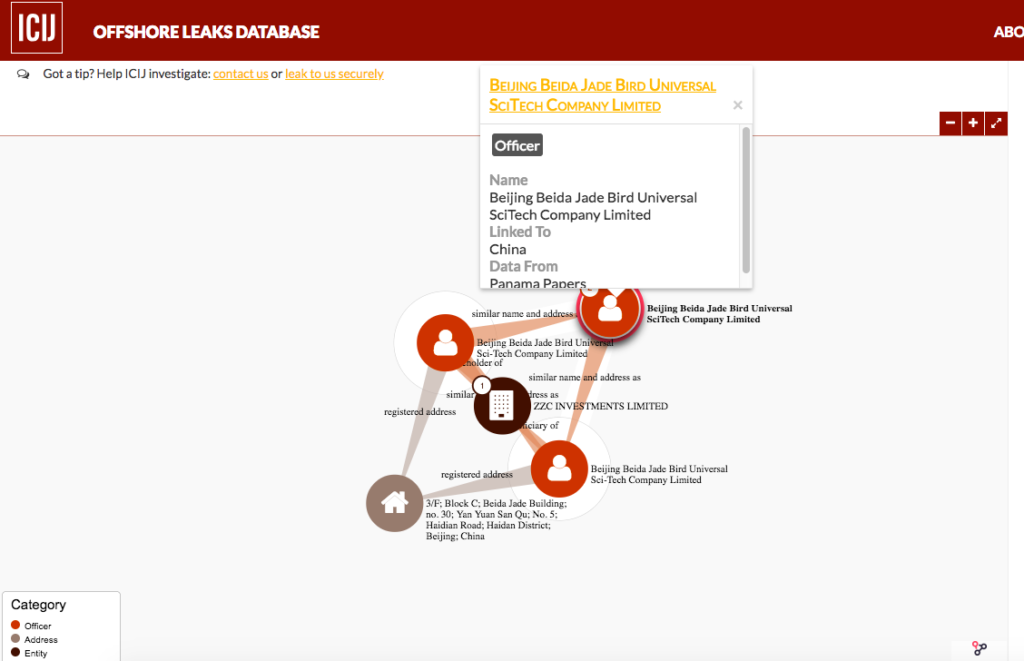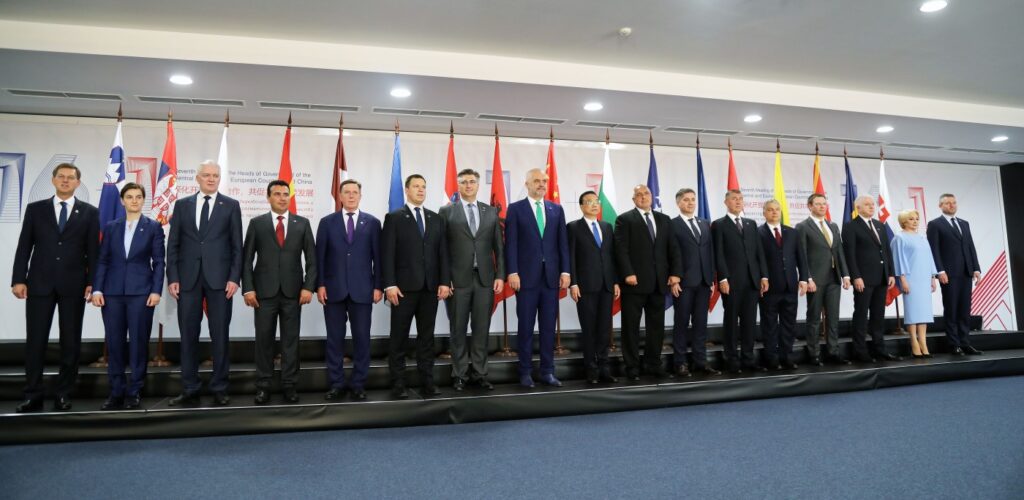Polish politicians have a mouth full of clichés about the entry of big Chinese businesses into their country. Off the record, they do not want the Chinese there and the only person looking after their interests today is Marek Suski, the head of the Prime Minister’s political cabinet. He is doing it unofficially. There is one problem, though: Suski – once a wig-maker, has no idea about China or business.
One of the first photos from the international travels of the right-wing President Andrzej Duda was taken a few months after he had won the elections, in autumn 2015: Duda is looking dreamily out of the window of a plane, smiling. On board of a scheduled flight from Warsaw, a Dreamliner is taking him on his first Asian visit. Destination: Beijing and Shanghai.
Journalists are stumped: why did the newly-elected state leader choose that country? Poland sends goods worth nearly two billion euros to China – just 1 percent of all Polish exports. The Chinese, on the other hand, are flooding the European country with commodity worth twelve times more (China is the second largest supplier of goods to Poland, after Germany). From the economic point of view, China is a threat. For diplomats and those who know Asia well, the matter is clearer – the Chinese side will certainly appreciate this gesture of the new President. Perhaps it is about attracting Chinese investors to Poland.
China as a counterbalance to the EU
An expert of the Polish-China affairs says: “Duda was going to a ‘16+1’ meeting. China had become present in Central Europe for the first time in 2012, which is when the 16+1 formula (16 Central European countries plus China – VSquare) was invented. Until then, China was not interested in Poland, they were not interested in what happened here after the transformation of 1989. Those better informed remembered the name Wałęsa. Until recently, 16+1 almost didn’t work at all outside the Balkans, but thanks to that initiative Central and Eastern Europe was actually put on Chinese agenda for the first time.”
The 16+1 format stirs up controversy in Western European countries as they find that it encroaches on areas reserved for the formal EU-China dialogue. They point out that the Chinese do not understand or respect the law that is essential in doing business with governments – public procurement law.
The 16+1 project is not making any progress. For now, it boils down to large international meetings that end in nothing. The Polish Ministry of Foreign Affairs expert says: “Bilateral relations, primarily with the three states regarded as superpowers: Germany, France, and Great Britain have been the key instrument of Beijing’s policy in recent years. Andrzej Duda has no ambition to change this. The President’s visit to China had a political dimension: the Law and Justice party (PiS), the politician comes from, likes to thumb its nose at the EU. It likes to show that Poland is perfectly well on her own, outside the community, and can play the game with the Asian giant alone.”
President elbows his way into a meeting
President Andrzej Duda is not on the plane alone – he is bringing 80 businessmen. He lands in Shanghai together with Polish entrepreneurs from the chemical, pharmaceutical and mining industries. It is hard to tell why exactly, because the 16+1 meetings are of a very general, diplomatic nature.
Andrzej Duda says that Poland will benefit from the New Silk Road, which is to connect China with countries of the EU: “I strongly hope that the strategic partnership between Poland and China, established in 2011, will now continue” he emphasized at the part of the meeting that was open to the media.
A politician of the right-wing party Law and Justice says: “Duda surprised the Chinese. They had a diplomatic and protocol problem with the visit as 16+1 is a summit of prime ministers, and here comes a president. The rank of offices was confused.”
The Chinese put on a brave face and Duda is met by President Xi Jinping. In record time, the visit gets the highest possible rank, with military assistance, national anthems and banners.
There is just one snag: the Polish guest’s show at the 16+1 summit in Suzhou is stolen by the Hungarian Prime Minister Viktor Orbán. He fiercely criticizes the European Union (as “rich and sluggish”) and boasts about his success: he is the only one out of the “16” to have put into effect the strategy of “opening to the East”, including China.
In Poland, Duda’s visit goes unnoticed. Only the right-wing press supported thorough ads by state companies sparkles with optimistic titles: ”New Silk Road or new ideas for Polish-Chinese cooperation”, “The Chinese to invest in LOT Polish Airlines? The Ministry of the Treasury is looking for an investor for the domestic carrier”, “Imports from China are gaining momentum”, “New Silk Road is an opportunity for the courier market”.
Former head of Polish Investment and Trade Agency Sławomir Majman who is now Foreign Affairs Advisor to the President of Employers of Poland claims: The New Silk Road initiative is China’s great national idea. Duda’s circles have sensed it quite well. He had a good speech in China, saying the initiative is the largest geopolitical project of the 21st century and, in a sense, it is so, because its economic and transport aspects are only secondary.
Let the Chinese build something
Why did PiS count on a partnership with China at the starts of its parliamentary term? According to politicians close to the Polish government we have talked to, counting on the Chinese is a kind of tradition, a Polish specialty since previous government of liberal Civiv Platform. In 2012, Chinese companies were to get Poles out of trouble: a 100 km motorway from Łódź to Warsaw had to be built fast, so that it would be ready for the Euro 2012 football championship. The job was undertaken by a Chinese company Covec, which left the construction site in a mess and… ran away from Poland. It was only after a few years that a settlement was reached, without publicity, between Covec and the Polish government, which solved the old problem.
Sławomir Majman underlines: It was the first case of China winning a tender to build from European funds. We had to explain to the EU why we were letting in companies from outside the EU. And the Chinese did not appreciate the seriousness of the situation, they did not have the right technicians and specialists. Today, Chinese business textbooks give Covec’s case as an example of how not to enter a market”.
An important politician of the ruling party says: “We were to get a great and cheap motorway, and it ended in an embarrassment. The road to Warsaw was finished by a different company and the deadlines were extended. That project left a nasty aftertaste. Still, faith in the Chinese persists. New projects in which the Chinese would play a major role are still born. These are concepts like ‘let China Airlines take over LOT Polish Airlines and together we will conquer the world’, ‘let the Chinese build super-fast railroads’ or ‘let the Chinese build a car factory’”.
One of the Polish experts on China says: “I was recently amused by an article entitled ‘The Chinese to build an electric car factory near Zgorzelec’. The article said that a factory might indeed be built, but near Görlitz, on the German side of the border. Perhaps the residents of Zgorzelec will find jobs there, but the factory will be German, because the market for electric cars is in Germany, not in Poland”.
One person who spoke to Vsquare said: “Big talk and gestures in the media regarding Chinese investments do not translate into realities. The actions of government agencies bring no significant effect”.
Between Warsaw and Budapest
Witold Waszczykowski, former Ministry of Foreign Affairs admits: “The Chinese show a general interest in Poland at the diplomatic level, but words do not turn into facts. Before Prime Minister Szydło’s visit to China they expected a presentation with details on where they could go in and invest. We made a presentation for them mentioning roads, railway and river routes and a new airport for Warsaw. There were mutual visits, Prime Minister Beata Szydło visited China in May 2017, but nothing has happened since then. Chinese investors also wanted to enter the Łódź Economic Zone, a special economic zone in which investors are exempt from taxes, but eventually nothing came of it either. We counted on those investments, we even opened a consulate in Sichuan. But the Chinese shift between Budapest and Warsaw like a pendulum. First, they wanted Budapest to be a Chinese hub for Europe, then Poland. Characteristically, China expected we would change our public procurement law for their investments. But these are EU regulations, they can not be changed, so the talks stalled”.
People we talked to indicate that at least one of the recent failures of Chinese investments in Poland originated in the government itself. Antoni Macierewicz, Polish Defense Minister until 2018, an ultra-Catholic, conspiracy theorist and representative of the radical, populist wing of the Law and Justice party is a great enemy of Chinese investments. “That concept of China’s expansion is part of a comprehensive concept of Western Europe’s agreement with Russia and China (…) and putting an end to Poland’s independent existence, because Poland, at the interface between Russian, Chinese and German influences, is the only country that can orchestrate an alternative to such a Eurasian superpower” Macierewicz has warned in 2015 on private TV in Toronto.
Minister defends against the Chinese
In 2017, Chinese President Xi Jinping is greeted in Poland almost like a king. Almost everyone is talking about the great importance of the visit by the President of the People’s Republic of China. During the visit, Xi and Andrzej Duda ceremoniously welcome a freight train that arrives at the PKP Cargo terminal in Warsaw from Chengdu, the capital of the Chinese province Sichuan. This is a symbolic inauguration of the New Silk Road: Poland’s acceptance of the Chinese concept of a new trade route connecting Asia with Europe.
President Duda assures: he wants to develop more road and sea connections together with the Chinese. But the situation in Poland is complicated: the President’s position is weaker than that of Antoni Macierewicz, the then Minister of Defence. The President is formally the head of the army in Poland, but the Defence Minister is the one who humiliates the President, blocking the promotion of his officials and giving signals that Duda does not mean much in politics. The conflict is controlled by Jarosław Kaczyński, the head of the PiS party, who uses the clash with Macierewicz to manipulate the President.
One of the first Chinese investments in Poland during the rule of PiS, which is to start new Polish-Chinese relations, is to build a large cargo handling terminal in Łódź. It is a central point in the country, close to Warsaw, and the terminal is to be built on a 33-hectare plot.
But the plot is owned by a military real estate agency which is under the authority of the Defence Minister. Soon after the visits of Polish politicians to China, the agency suspends a tender for the plot. The Chinese from the Polish-Chinese company which was to buy the land do not like it. They close their office in Łódź and fly back to China. Macierewicz makes an announcement: “Every effort will be made to ensure that the dry port which is to be located in Łódź is at the disposal of a company with majority Treasury shareholding, not people with an unknown reputation”.
“An unknown reputation” is an old Polish phrase used to describe suspicious, unreliable and dangerous people.
Airport tailored for an investor
Experts say that Poland is too small a country, too insignificant a player and too small a market for China to establish special economic relations with and make Poland a “gateway to Europe”. In addition, the newcomers from Asia are aware of the political context: the EU does not like China’s monopolistic tricks and the dumping they use (eg. in the steel industry). Therefore it is important for China to have good relations with the most important EU players. In this game, Poland is doomed to stay on the periphery for now.
Majman says: “In reality, investors from China are interested in two or three areas today. The Central Communication Port worth about PLN 40 billion – airport, construction and service. Plus modernization of Polish ports and rivers, as the Chinese have been successfully doing it all over the world, and the energy industry, including nuclear energy – a Chinese-French consortium which has a contract for the construction of a nuclear power plant in Great Britain and has ousted Rosatom in Bulgaria is interested in this area. I know they are interested in Poland, coming here for work visits.”
Central Communication Port (CPK) is one of the hottest topics in Poland today. It is planned as an air hub that will take over traffic in Central Europe and relieve the crowded airports of Warsaw. Our source at the Ministry of Foreign Affairs says: “Nobody will admit to it officially today, but the entire concept of the airport was invented for the Chinese; it was first taken to China by former Foreign Minister Witold Waszczykowski, when he went there before Duda’s visit in 2015. A year ago, Chinese No. 3 in the political bureau of the Communist Party of China was in Warsaw. He demanded that regulations on public procurement be repealed – the government refused and the matter died down. Now the head of CPK is in charge of dealing with it on behalf of the government; I don’t know the current status of negotiations, but for China it is a big enough project to be interested in. Official propaganda says CPK will bring thousands of jobs and Poland’s development, but no one will admit that the Chinese could make money on the investment”.
Jacek Bartosiak, a lawyer, PhD of social sciences and expert in geopolitics and strategy, has recently become the head of the CPK. – He is an advisor of Prime Minister Morawiecki. In the ruling party he is recognized as a guru of geopolitics, also in the Chinese context. His promotion is an additional signal that the Polish government really puts China at the construction of the CPK – describes our source close to the government, former unofficial advisor of minister of foreign affairs.
Advised by a bauble manufacturer
Who in the Polish government and Polish business looks after Chinese investments then? It is a hard question.
Formally, it is the role of the Polish Investment and Trade Agency, but it has no real experts in that field in its ranks. People who would know the language, the culture and the specificity of contacts with Asian contractors.
Until recently, Mariusz Bulski – a former actor who played himself in the “Smolensk” movie about the Polish president’s plane crash over Smolensk in western Russia, killing president and 95 other members of political and military elite (“Smolensk” threatens to become a political statement masquerading as fact, supporting conspiracy theories). Bulski, tied to Law and Justice a manufacturer of Christmas baubles, was considered one of the most important experts on China. “His main advantage was a Chinese wife who runs a language school”, says one of PAIH officials. “He is an unconventional figure, a nationalist, but he is not fit for front-line fight. Today, there is no serious expert on China at the agency.”
Until recently, there were two people close to Prime Minister Mateusz Morawiecki who helped in contacts with China: former Deputy Minister of Development Radosław Domagalski-Łabędzki (the founder of the Polish-Chinese Chamber of Commerce in Shanghai), who left for a better-paid job at the state-owned c ompany KGHM, and then landed at the propagandistic Polish National Foundation. The second person was Adam Brożek (former director at the Ministry of Development). He also chose a better pay at KGHM. “Brożek also has a Chinese wife but, unlike Bulski, he has broader horizons. When they both (Brożek and Domagalski-Łabędzki – VSquare) changed politics for making money, a vacuum formed around the Prime Minister as far as Chinese affairs are concerned”, one of our sources at the Polish government tells us. ”China is now the domain of party activists who have no idea where they are going.”
Advised by swindlers…
When we ask businessmen who they think is the most influential person in dealing with the Chinese, they point to Marek Dochnal.
Dochnal is one of the best known (and discredited) Polish lobbyists. When he was at his best, female magazines used to make him a prince charming and a role model. He gladly boasted about knowing the Queen of England, having a dragonfly-shaped desk and luxury cars which were his “natural environment”.
In 2004, today 57-year-old Dochnal was accused of bribing a left-wing MP, head of the parliamentary state control committee. Dochnal allegedly gave him benefits (cash, a luxury watch, the right to use an expensive Mercedes) in return for information or actions concerning the sale of shares of Polskie Huty Stali (Polish steel holding company) to LNM Holdings and the privatization of the G-8 Group and Huta Częstochowa. Dochnal (who spent four years in custody) was convicted for that in 2012, but three years ago the Supreme Court referred the case back to a lower court.
Dochnal’s name is associated with a scandal – there is no way that he could officially engage in any state-related business. For many years, he has been running a business outside of Poland, in China. Dochnal and his colleagues work for the benefit of a Chinese company Pinggao Group which builds transmission networks for a Polish state-owned company Polskie Sieci Energetyczne (the investments are worth PLN 350 million and 61.8 million).
Marek Dochnal’s company is called International Venture Partners. Dochnal is its CEO. It is registered in Singapore and Beijing. Dochnal’s associate is Tomasz Karwowski – his good friend and a former MP (he was arrested on forging documents on the occasion of Dochnal’s scandal).
An expert on China says: “Dochnal convinced the Chinese with his contacts. We overestimate the Chinese thinking they have God knows what knowledge, while in fact they know completely nothing about the region. They make rookie mistakes, they have no idea about the realities of regional policy. I am sure he helped them to enter the Polish market.”
Although Marek Dochnal’s presence in business with Chinese people stimulates imagination, he probably does not have much influence today. The Law and Justice government, which is sensitive to people who are rich and entangled in unclear interests, would not allow him to do serious businesses in today’s Poland.
…and advised by amateurs
Our sources tied to the government say there is one figure in Polish Prime Minister’s circles who is extremely active in Chinese affairs. It is Marek Suski, a prominent member of Law and Justice, one of the most important people in the government for the past several months – he is the head of Prime Minister Mateusz Morawiecki’s political cabinet. He is an amateur painter, and a makeup artist and wig-maker by education.
Someone who knows Polish-Chinese relations says: “Suski is the key person in Morawiecki’s circles in charge of Chinese affairs. He is an amateur. He has been fascinated with China for a few years, he goes to meetings, conferences, he even has some contacts in the Communist Party of China. He brings Chinese businessmen here, recently he brought a team expected to build an entertainment park of some kind. A year before, I saw Suski on a plane to Budapest going for the 16+1 meeting with some businessmen. He is a member of the parliamentary group for Polish-Chinese cooperation.”
In 2017, Suski showed his wit at China – CEEC Countries Political Parties Dialogue 2017 international conference in Bucharest. The goal of the conference is for representatives of European countries (including Poland) and China to talk about political dialogue. As part of the conference, each of the individual countries were to give an opening speech. Poland was to be represented by a Deputy Speaker of the Sejm, Stanisław Tyszka, who did not turn up. Then Suski came out on stage, uninvited, and gave a speech in Polish, without an interpreter. – My country raised the Polish-Chinese relations to the highest priority – he said.
In the same year, Suski and in the company of Chinese people came to Radom, a run-down town 100 km from Warsaw. He shone standing next to Lv Da Wei of Beida Jade Bird company. He presented him as a potential investor. In what industry? Nobody knows. “He represents a capital group operating in a number of industries and achieving multibillion annual revenue”, assured Suski.
By sheer coincidence, Beida Jade Bird World had organized a festival in China at which Suski was a guest.
The CEO of Beida Jade Bird World said that his interests include “animation and computer games”. Little is known about the company in Poland except that its name appeared in the documents of the Panama Papers scandal. Beida Jade Bird is probably the company thinking about opening an amusement park in Poland.
Each of Suski’s trips to China costs over ten thousand zlotys, or even more. How many have there been? What has been the total cost of the MP’s passion? Neither the Polish parliament nor the Prime Minister’s office answered our question.
Waiting for a rain of gold
Our source close to the government says: “A 16+1 meeting with Chinese Prime Minister took place in Sofia in the summer. Prime Minister Morawiecki cancelled his participation at short notice, two or three days before the date of the meeting. Minister Jarosław Gowin replaced him in the end. As a punishment, the organizers seated him among the Bulgarians, in a far-off row. It was a wasted opportunity, because such meetings are always attended by the heads of the largest Chinese corporations, and this time there were exceptionally many of them, at the highest level, because straight from Sofia they were flying out to meet with Angela Merkel. Poland was represented by three officials”.
Expert on Chinese affairs: “When it goes for Chinese investments, we are at the crossroads between great expectations and disappointment at not having a rain of money fall on us. Meanwhile, EU money will run out in 2020, and there is no major investment on the horizon”.
The moods in the electorate of the ruling party are not without significance for foreign, exotic investment. PiS voters are not very fond of strangers. “So who is actually our strategic partner? The communists or the Anglo-Saxons, the Chinese or the Americans, the Christians or the Confucians? Does this government have a coherent vision of some kind?” readers of one of the pro-government portals are outraged.
Our sources at the Polish Development Fund (PFR) indicate that the combined value of all Chinese direct investments in Poland in the years 2000-2016 amounted to only approx. EUR 950 million. And that shows where we really are and what position we occupy in the Chinese hierarchy: Germany got 12 times more investments in one year than Poland in 16 years. According to PFR experts, attracting Chinese investments is in many aspects unprofitable for Poland, as imports from China are over a dozen times higher than exports. This discourages Poland from expanding its offer for the Chinese.
The Chinese investments currently being carried out by the Polish Investment and Trade Agency can be summarised in several data: 16 projects with a total value of EUR 1.407 million and a potential employment of 3.8 thousand people. The dominant sector in terms of total value: tires (450 million euro in total). The dominant sector in terms of the total number of potential jobs: electro-mobility (1.5 thousand jobs in total). The dominant sector in terms of the number of projects: electromobility (4 projects with a total value of 226 million euro).
Numbers and figures look pretty good, but as one of the experts says: “We have neither a vision of how to become present in China, nor a product, nor even a marketing plan to coordinate our activities”.
Wednesday noon, 26th September. The Embassy of China in Warsaw is getting crowded. Four hundred VIPs came to celebrate 69th Anniversary of the Founding of the People’s Republic of China. Among them politicians from all parties, both left and right-wing, businessmen, lobbyists. Just to mention Paweł Pudłowski (Nowoczesna), Piotr Zgorzelski (PSL) or Ryszard Terlecki (PiS, vice-marshal of the Polish Parliament). – Every year the Chinese Ambassador invites VIPs for this meeting. It’s the finest event, very refined, best Chinese cuisine –one of guests describes to Vsquare .
It seems that so far the yearly celebration has been the most impressive joint Polish-Chinese investment in their relationship.
Anna Gielewska is co-founder and editor-in-chief of VSquare and co-founder of Polish investigative outlet FRONTSTORY.PL. She is also vice-chairwoman of Fundacja Reporterów (Reporters Foundation). A journalist specializing in investigating organized disinformation and propaganda, Gielewska was the John S. Knight Fellow at Stanford University (2019/20) and has been shortlisted for the Grand Press Award (2015, 2021, 2022) and the Daphne Caruana Galizia Award (2021, 2023). She was the recipient of the Novinarska Cena in 2022.
Co-founder and editor-in-chief at FRONTSTORY.PL, Wojciech Cieśla is an award-winning Polish journalist who, since 2016, has worked with Investigate Europe. He is the co-founder and chairman of Fundacja Reporterów (Reporters Foundation). He is based in Warsaw.

